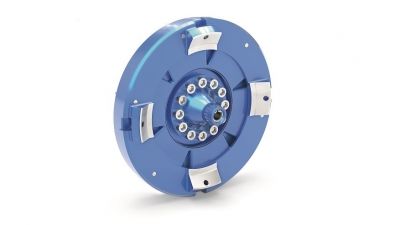Voith Offers Flexible HP Coupling for Automotive Applications
The new HP Coupling from Voith was designed for testing internal combustion engines on test rigs under realistic conditions. Its Voith Hydrodamp Technology, which has undergone additional development, protects the driveline even at high speeds and temperatures.
In the automotive industry, the new, highly flexible HP Coupling protects the driveline of test rigs against critical torsional vibrations. Such vibrations are unavoidable when testing internal combustion engines and put stress on the connected components. In addition, the HP Coupling shifts critical resonant frequencies of the system below the operating speed range and dampens undesired alternating torques. This increases the service life of all drive components of the test rig.
In past years, the standards for these routine tests have undergone considerable change. For the test engineers to get results that largely corresponded to everyday conditions they rely on bell-house mounted arrangements instead of drive shaft arrangements. In this process, a realistic dummy transmission is flange-mounted to the internal combustion engine, thus simulating the drive train in a vehicle to a high degree. With reinforced spring assemblies, an enhanced coupling seal and damping grease optimized for temperature, the new HP Coupling from Voith provides maximum protection for the test rig even with this new test procedure.
The HP Coupling contains another innovation; the springs operate reliably over a wide speed range allowing test runs of up to 8500 rpm. Even the damping grease is designed for high speeds and the associated temperatures, which ensures reliable operation of the coupling up to a temperature of 150 degrees Celsius. The optimized lubricant also provides better damping that reduces alternating torques in the drive train to a minimum. This increases the service life of all components connected in the test rig. Voith offers up to 16 different spring hardness values. This makes it possible to finely adjust the coupling with precision to the requirements of the customer.
The additional visco-hydraulic damping of the HP Coupling increases the damping effect in proportion to the coupling’s angle of twist. This is the decisive benefit over arc spring couplings used in bell-house mounted test rig arrangements today. In this case, severe torsional vibrations, such as those occurring in typical test scenarios, also lead to high damping. This gives the coupling optimal damping behavior across the entire nominal speed range.
When sealing the coupling, Voith has further enhanced the proven Voith Hydrodamp Technology with an additional sealing sheet including the seal. This prevents grease from escaping as a result of the centrifugal forces that occur at high speeds. A special PEEK material increases the spring assemblies’ resistance to wear and strength at high speed, substantially improving the service life of the HP Coupling.
Thanks to this enhanced Voith Hydrodamp Technology, the new HP Coupling permits realistic tests over all speed ranges. As the coupling also protects the test rig against critical torsional vibrations and natural frequencies, downtimes are decreased, thereby reducing costs and increasing the general cost-effectiveness of the test rig.
In initial prototype tests at a well-known vehicle manufacturer, the HP Coupling satisfied all the requirements for temperature stability and speed. Voith will debut the new HP Coupling at the Automotive Testing Expo 2019 in Stuttgart at fair Booth 1374 from May 21-23.




